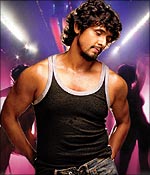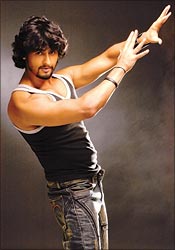|
|
| Help | |
| You are here: Rediff Home » India » Movies » Interviews » Sonu Nigam |
|
 Sonu Nigam | ||
| |||||||||||||||||||||||
|
| |||||||||||||||||||||||
I don't want to be a wholesale movie singer," says Sonu Nigam [Images], while readying for a concert tour that will take him across a dozen cities in North America. "My interests are too wide."
Nigam talks of the fun he had doing the pop albums Mausam, Sapnay Ki Baat, Kismat, and Deewana; hosting the TV show Kisme Kitna Dum Hai, and being a judge on Indian Idol [Images]
Television, he says, is even more enjoyable than play-backing for movies -- an understandable sentiment from one who got a good foothold in the industry through the music-based TV show SaReGaMaPa, which he hosted fror a while.
Breaking into the big time wasn't easy -- he had been knocking on doors in Mumbai for about 15 years before attracting notice, around 1997, with his work in movies such as Border and Pardes.
Popular ditties for films such as Taal [Images], Refugee and Pukar reinforced his growing popularity, and today, Nigam is ranked with the likes of Udit Narayan and Sukhvinder Singh as an A-list singer for Bollywood composers. He spoke to Managing Editor Arthur J Pais:
There are stories about you wanting to give up playback singing. Why?
I have certainly been cutting down the number of songs that I have been singing in the last two or three years. I have so many other interests, and I want to pursue them with greater concentration. I was never in this business to become the most recorded singer or anything of that sort. And it was never really my intention to spend so much time singing for the movies.
Most people struggle to get into this field, you want to get out?
Over 10 or 15 years, being playback singer was the only thing that looked feasible. When I first started out, there were very few people who were successful as singers outside of the movies. Today, there are far more avenues open.
You have established yourself as a composers' favourite, aren't they upset when you say no?
I cannot help it. I guess they would be. It is important for me, much more than ever, that I should be fully happy with what I am doing.
Is it like you have set a date, from which point on you won't do playback?
Not at all. Everything has to be a gradual process. I did not become a well-known singer all of a sudden. It was a very slow, and at times a very painful, process. So when I am thinking of so many other things I want to do, I will continue slowing down as a playback singer. Like my rise, this too will be a gradual process.
If you had to decide on one thing to do, what would that be?
It is a tough question. I think I will do the concerts and forget my pop albums, my movie songs and my interest in acting. Concerts never fail to give me the biggest high.
What is it about concerts that give you that high?
I feel I am like a dictator (laughs) when I am performing live. You have to control thousands of people, and in India, I have performed before over 80,000 people. You have to be a performer in a concert and you have to be hypnotist, and at the same you are mesmerising the audience, you should also be very, very humble.
 Does the prospect of going live scare you?
Does the prospect of going live scare you?
Not scared, no, but I am aware every second that it is indeed a live show. The listeners just won't care how well your recorded song in Kal Ho Naa Ho or Fanaa [Images] sounded. What the listeners want is for you to sound as fresh and as melodious you can be. In fact, they expect you to sound better than in a recording studio. When I face a live audience, I feel I am praying, that I am repaying God for all the blessings that I have received.
What are the pitfalls, the things that can turn a concert into a flop?
As far as an artist is concerned, I would say arrogance and indifference; taking the audience for granted, and being acutely money-minded. You can't think this concert is not going to be very big, that I am not getting much money, so I am not going to sing many songs.
You were hardly four when you first sang in public�
I was then singing some of Mohammad Rafi's best songs such as Kya Hua Tera Wada. I am singing my own songs today, but there are times I want to recreate the magic of a few Rafi hits.
Your father (the singer Agam Kumar) has always been fully supportive of your goals as a singer and entertainer. What have you learned most from him?
He never failed to emphasise the importance of being humble and responsible, and to treat everyone, including an up and coming composer, with respect.
You are performing in America after a gap of about three and a half years�
Not exactly, there is a clarification to be made. When I was here more than three years ago, it was as part of an AR Rahman concert. I sang three songs, so it was hardly my concert. I was here more than five years ago singing my own songs throughout the concert, and now I am back again.
How does it feel to be back here?
It is a big challenge, but I have been enjoying it. I am singing some of my better known songs which weren't there five and half years ago. A lot has happened in the last three years, and my fans are eager to hear, live, my songs from such films as Parineeta [Images] (Piyu Bole and Soona Man Ka Angan), Paheli [Images] (Dheere Jalana), Main Hoon Naa. There are so many beautiful songs that I am going to sing for the very first time in a concert in America and Canada [Images] that I feel I am in a concert here for the very first time in my career.
How did you come to choose the name for this show?
The show is called Simply Sonu for very good reasons. I am going to be like a child before the audience, giving in to their requests. If they want Veer-Zaara (Do Pal), I am ready for them. If they want Suraj Hua Maddham from Kabhi Khushi Kabhie Ghum, I am ready for it. And I am even ready if they want me to sing any song, especially the songs of my idol, Mohammad Rafi. I want my shows to be fully interactive.
What can surprise you in a concert?
When I get request for a nice but not well-known song. Or the overwhelming reaction to a song.
Do you remember one such overwhelming response?
It happened in Delhi. I was singing the Anu Malik [Images] composition Sandese Aate Hai from the movie Border. There was so much of applause and demand that I sing it again. I was too happy to oblige. I knew the song was popular, but I had no idea how big it was, and how big it was going to be in a few months.
That was in the year 1997. Would you say it was your first huge hit?
There was also another hit the same year, Ye Dil Diwana in Pardes. The second song proved that I could sing lively, hip numbers, that I was a versatile singer.
Who else, apart from Anu Malik, gave you the opportunities early on in your career?
The break in Border came after nearly a decade of struggle in Mumbai; I had sung a handful of songs for the veteran composer Usha Khanna, whose career was on the decline. But she was composing songs for a few TV shows. And I also sang some numbers for Amar-Utpal, whose career was going nowhere.
Does the sadness of those days of struggle still persist?
There were many good songs I had sung for many films -- but they were later 'dubbed' by the established singers, whose voice was retained in the films and on the tapes. I had sung a few minor songs for Anu Malik before Border. But when he decided to give me a major break in Border everything began to change for me. A few years later, I would sing Saatrangi Re for AR Rahman in Dil Se. Among my favourite numbers for Rahman is Mera Rang De Basanti [Images] from the film The Legend Of Bhagat Singh. There is hardly a concert where that number is not featured.
Now that you are established, what do you look forward to?
In some ways, being a mentor, helping younger singers find their voice. Giving them breaks, if possible.
What would you expect them to take from your own success?
Learn to be focused and be patient. Never feel dejected when someone ignores you or makes you wait for a long time. I never really felt discouraged during my struggling days. I knew I had to wait for the right opportunity at the right time, and it came with Border and Pardes.
|
|
| © 2008 Rediff.com India Limited. All Rights Reserved. Disclaimer | Feedback |